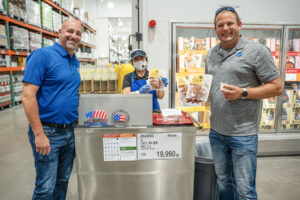Illinois pork producers explore trade potential in South Korea
By RHIANNON BRANCH
FarmWeek

A recent trip to South Korea to strengthen trade relationships is fresh on the mind of Illinois Pork Producers Association (IPPA) President Josh Maschhoff as he celebrates National Pork Month.
“There aren’t enough positive attributes that I can throw out here that would describe how awesome the trip was, it was just a wealth of knowledge,” Maschhoff told FarmWeek about the trip he attended last month with the U.S. Meat Export Federation, representing the National Pork Board.
“I gained perspective seeing how the Korean people and one of the US’s larger international consumers, use our products. The culture of how they use that product and get it to their consumers is significantly different.”
Maschhoff said that South Korea is about the size of Indiana but with a dense population of about 52 million. With less open land people there don’t have as many opportunities to grow their own food, and those living in high-rise buildings are working with small kitchens and inconveniences traveling to eat out.
“Right now, Korea is driving a huge sector called home meal replacement,” he said. “It’s about trying to take the different segments of your balanced meal and build them into a one-stop shop package that might be pre-cooke
**Editor’s Note: If you find the story here of value, consider clicking one of the Google ads embedded in the story. It costs you nothing but Google will give the website owner a few cents. This is a way to help support local news at no cost to the reader.
d or easy to cook at home with delivery service to their door.”
South Korea is the third largest export destination for US pork muscle cuts, reaching $422 million through July 2025. Belly is a cut Koreans prefer, but US demand for bacon makes it harder to get, so the country is thinking outside of the box.
“They’ve done some very unique things like slicing the shoulder very thin and smoking it to get not quite the same texture, but the flavor and experience of bacon,” Maschhoff said.
“It was educational for us, but it was also about building relationships because having personal connections means a lot to them from a customer-consumer standpoint.”
The group visited foodservice and retail locations including Costco and E-Mart, toured the Port of Busan, and key importing companies such as Fresheasy, Frank Burger and Highland Foods. The CEO of Highland Foods specifically wanted to host the team to build relationships directly with US farmers because their customers are demanding the quality and taste of US beef and pork.
“They very much appreciate and have an alignment with the US, looking at the US as a very sustainable source of their beef and pork,” Maschoff said, noting a recent poll that showed 70% of the population considers the US as positive or favorable. “If they see a US label on the products in the stores, that carries a lot of weight.”
Maschhoff said trade is top of mind for him as 30% of US pork is exported.
“The rhetoric between countries and potential trade impact barriers can really affect the price of the market and longstanding relationships between free access countries can be challenged,” he said. “I think it’s important that we continue to look at how to get free trade agreements with each of these external countries — that’s really going to impact demand much greater than anything we think we can do on the domestic side.”
The Maschhoffs work with about 350 production partner families to raise about 3 million market hogs a year. Maschhoff said favorable hog prices and lower feed costs are highlights of hog production this year, but there are some headwinds including other inflationary costs and animal disease threats.
He said it is beneficial to have a month that focuses on promoting pork.
“What these farmers are doing on an everyday basis really allows us to promote and show some appreciation to the group that’s out there getting it done every day,” Maschhoff said.
This story was distributed through a cooperative project between Illinois Farm Bureau and the Illinois Press Association. For more food and farming news, visit FarmWeekNow.com.





































